Rear Brake Caliper Replacement JE5, J55
Removal Procedure
Warning: Refer to Brake Dust Warning in the Preface section.
Warning: Refer to Brake Fluid Irritant Warning in the Preface section.
Caution: Refer to Brake Fluid Effects on Paint and Electrical Components Caution in the Preface section.
- Inspect the fluid level in the brake master cylinder reservoir.
- If the brake fluid level is midway between the maximum full point and the minimum allowable level, no brake fluid needs to be removed from the reservoir before proceeding.
- If the brake fluid level is higher than midway between the maximum full point and the minimum allowable level, remove brake fluid to the midway point before proceeding.
- Release the electronic park brake cable tension, if equipped. Refer to Parking Brake Cable Adjuster Disabling.
- Raise and support the vehicle. Refer to Lifting and Jacking the Vehicle.
- Remove the tire and wheel assembly. Refer to Tire and Wheel Removal and Installation.
- Install a C-clamp against the outer brake pad and the rear of the brake caliper body.
- Slowly tighten the C-clamp until the brake caliper pistons are compressed into the brake caliper bores.
- Remove the brake hose fitting bolt (1).
- Remove the brake hose fitting gaskets (2) and the brake hose (3).
- Using a backup wrench on the brake caliper guide pin, remove the brake caliper guide pin bolts (1).
- Remove the brake caliper (1).
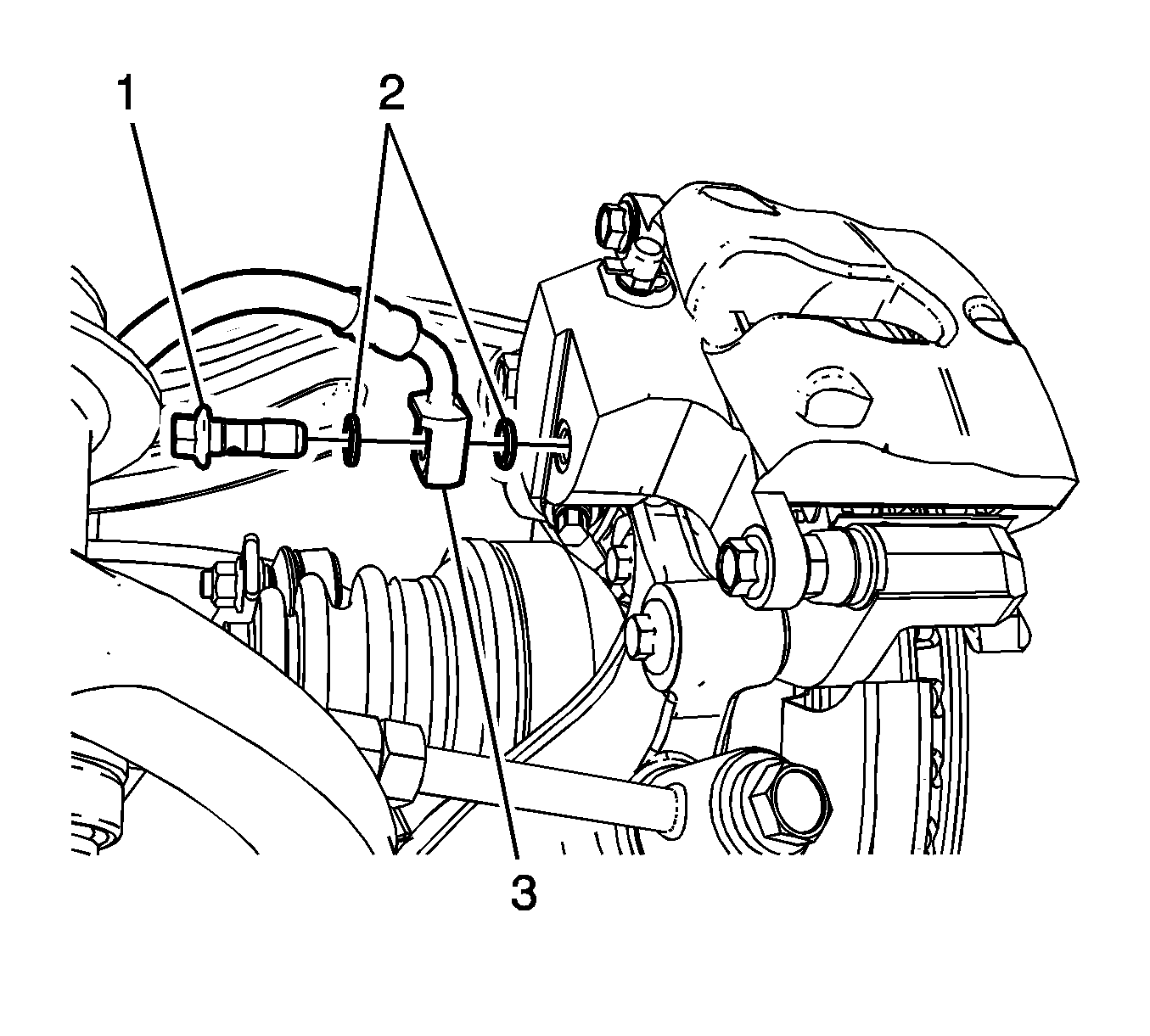
Note: Do not reuse the brake hose fitting gaskets.
Discard the brake hose fitting gaskets.
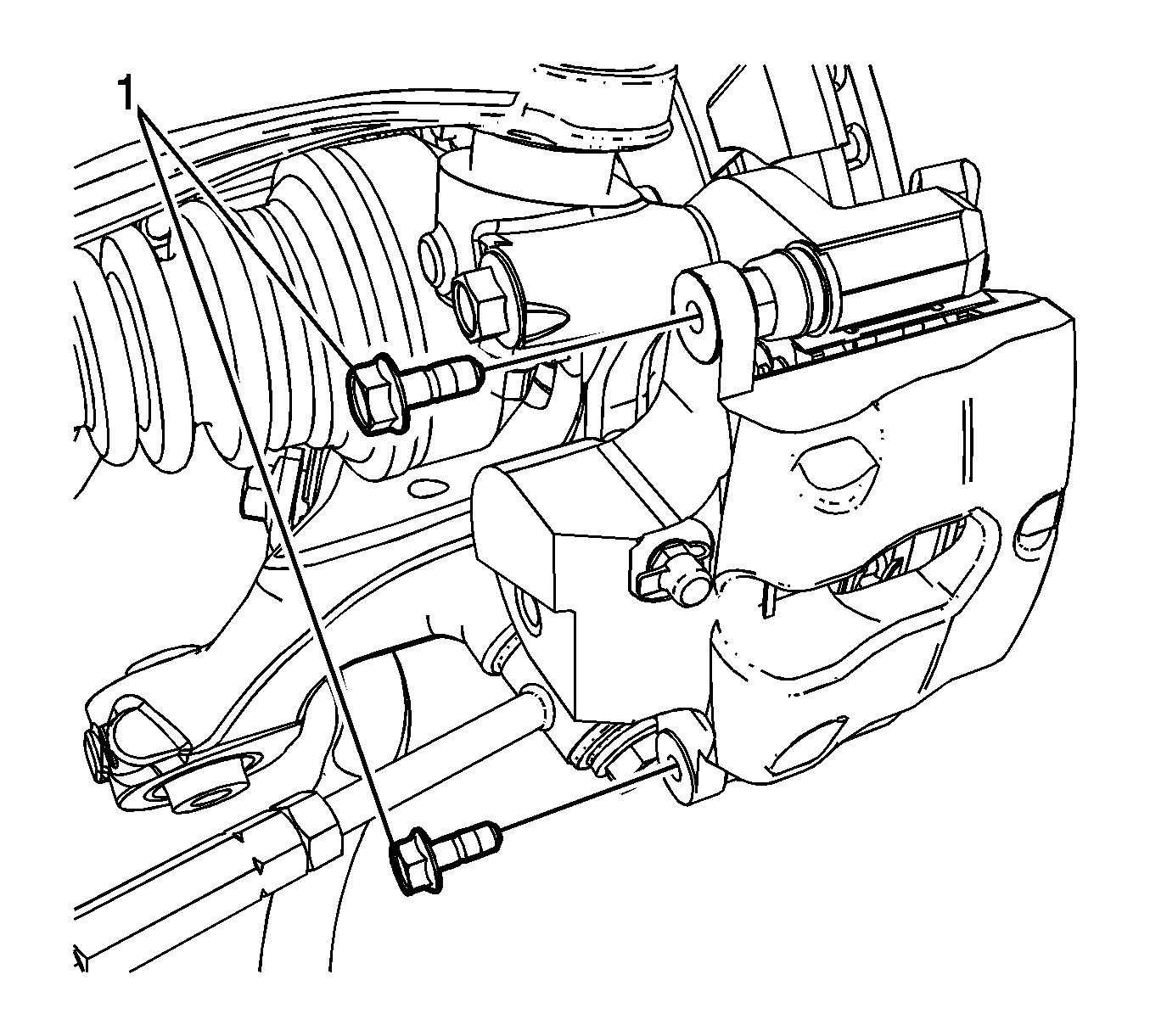
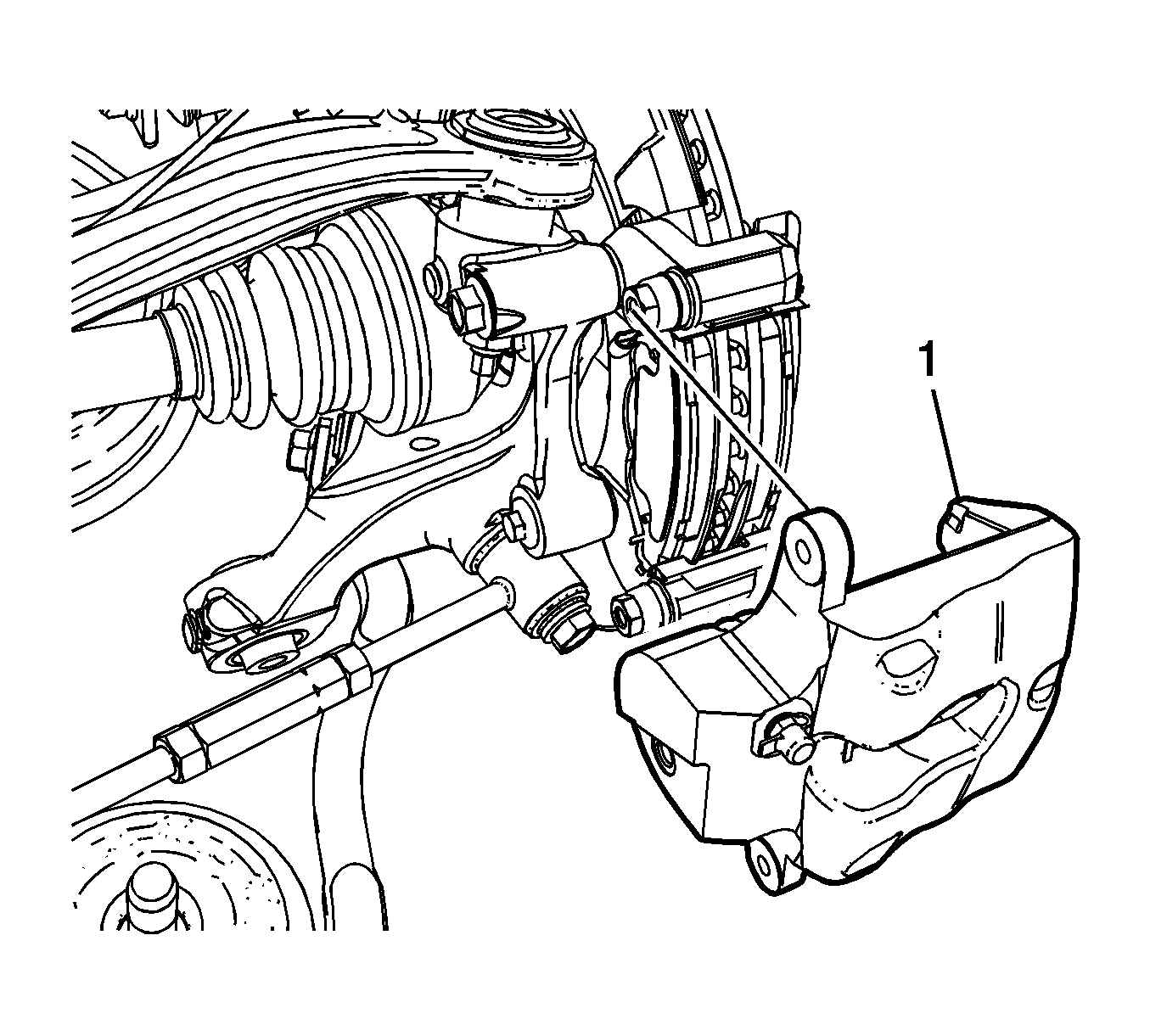
Installation Procedure
- Inspect the brake caliper guide pins, seals and brake pad springs for damage and/or corrosion. Refer to Front Disc Brake Mounting and Hardware Inspection.
- Install the brake caliper (1).
- If reusing the caliper pin bolts, prepare the bolts and the guide pins for assembly:
- Apply threadlocker GM P/N 12345493 (Canadian P/N 10953488), or equivalent to 2/3 of the threaded length of the brake caliper guide pin bolts. Ensure there are no gaps in the threadlocker along the length of the filled area of the bolts.
- Allow the threadlocker to cure approximately 10 minutes before installation.
- Using a backup wrench on the brake caliper guide pin, install the brake caliper guide pin bolts (1) and tighten to 60 N·m (44 lb ft).
- Assemble the brake hose fitting bolt (1) and 2 new brake hose fitting gaskets (2) to the brake hose (3).
- Install the brake hose assembly to the caliper and tighten the fitting bolt to 49 N·m (36 lb ft).
- Bleed the hydraulic brake system. Refer to Hydraulic Brake System Bleeding.
- Install the tire and wheel assembly. Refer to Tire and Wheel Removal and Installation.
- With the engine OFF, gradually apply the brake pedal to approximately 2/3 of its travel distance.
- Slowly release the brake pedal.
- Wait 15 seconds, then repeat steps 11 and 12 until a firm brake pedal apply is obtained. This will properly seat the brake caliper pistons and brake pads.
- Fill the brake master cylinder reservoir to the proper level. Refer to Master Cylinder Reservoir Filling.
- Set the electronic park brake cable tension, if equipped. Refer to Parking Brake Cable Adjuster Enabling.

Note: If reusing the brake caliper guide pin bolts, the threads of the brake caliper guide pin bolts and the threads of the guide pins must be free of residue and debris prior to application of threadlocker in order to ensure proper adhesion and fastener retention.
| • | Thoroughly clean the residue from the guide pin bolt threads by using denatured alcohol or equivalent and allow to dry. |
| • | Thoroughly clean the residue from the guide pin threads by using denatured alcohol or equivalent and allow to dry. |
Caution: Refer to Fastener Caution in the Preface section.


Rear Brake Caliper Replacement J56
Removal Procedure
Warning: Refer to Brake Fluid Irritant Warning in the Preface section.
Caution: Refer to Brake Fluid Effects on Paint and Electrical Components Caution in the Preface section.
- Inspect the fluid level in the brake master cylinder reservoir.
- If the brake fluid level is midway between the maximum-full point and the minimum allowable level, no brake fluid needs to be removed from the reservoir before proceeding.
- If the brake fluid level is higher than midway between the maximum-full point and the minimum allowable level, remove brake fluid to the midway point before proceeding.
- Remove the brake pads. Refer to Rear Disc Brake Pads Replacement.
- Remove the brake hose fitting bolt (1).
- Remove and discard the brake hose fitting gaskets (2) from the brake hose (3).
- Remove the brake caliper bolts (1) and the brake caliper.
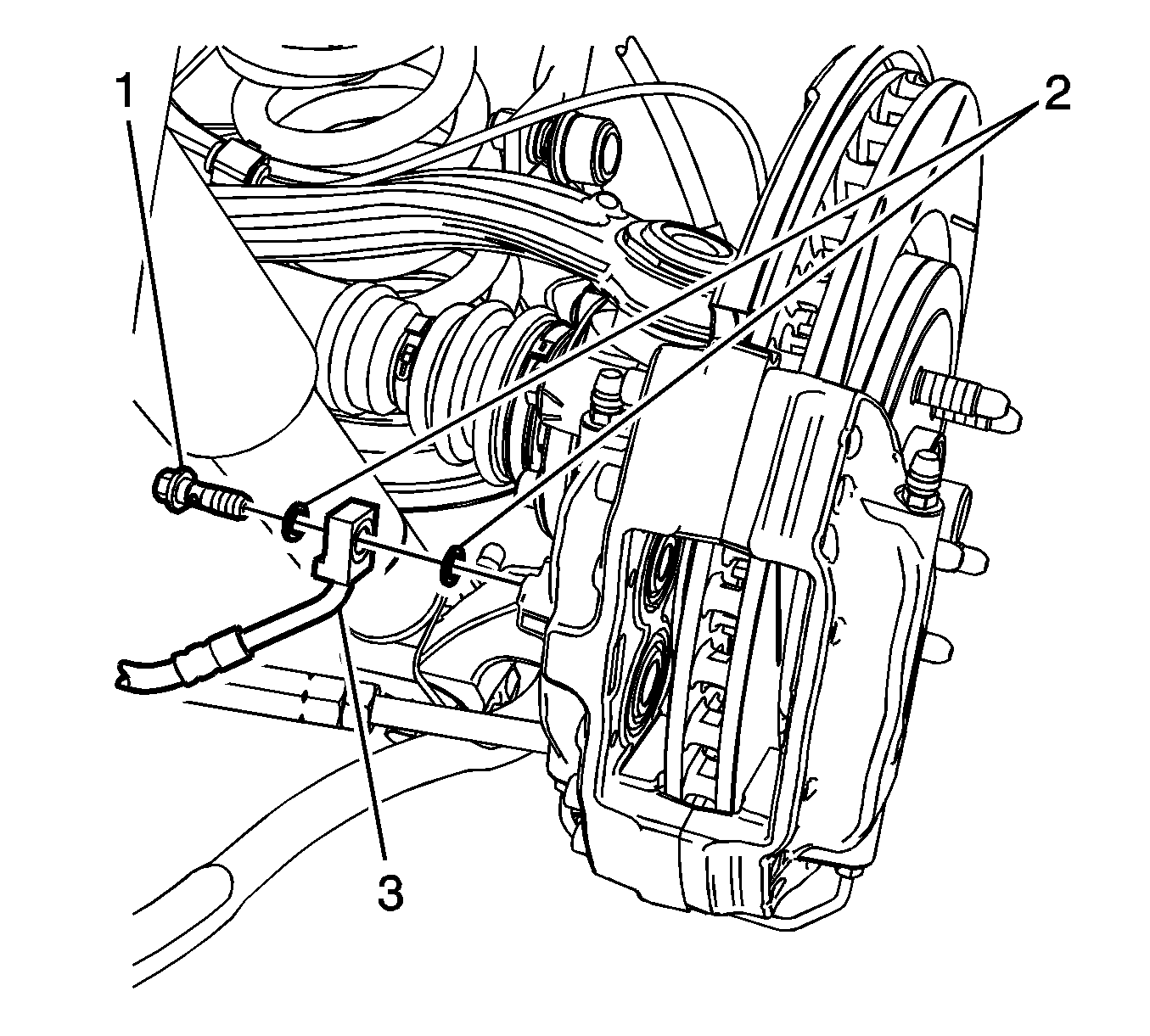
Cap the brake caliper inlet port to prevent brake fluid loss and contamination.
Note: Do not reuse the brake hose fitting gaskets.
Cap the brake hose fitting to prevent brake fluid loss and contamination.
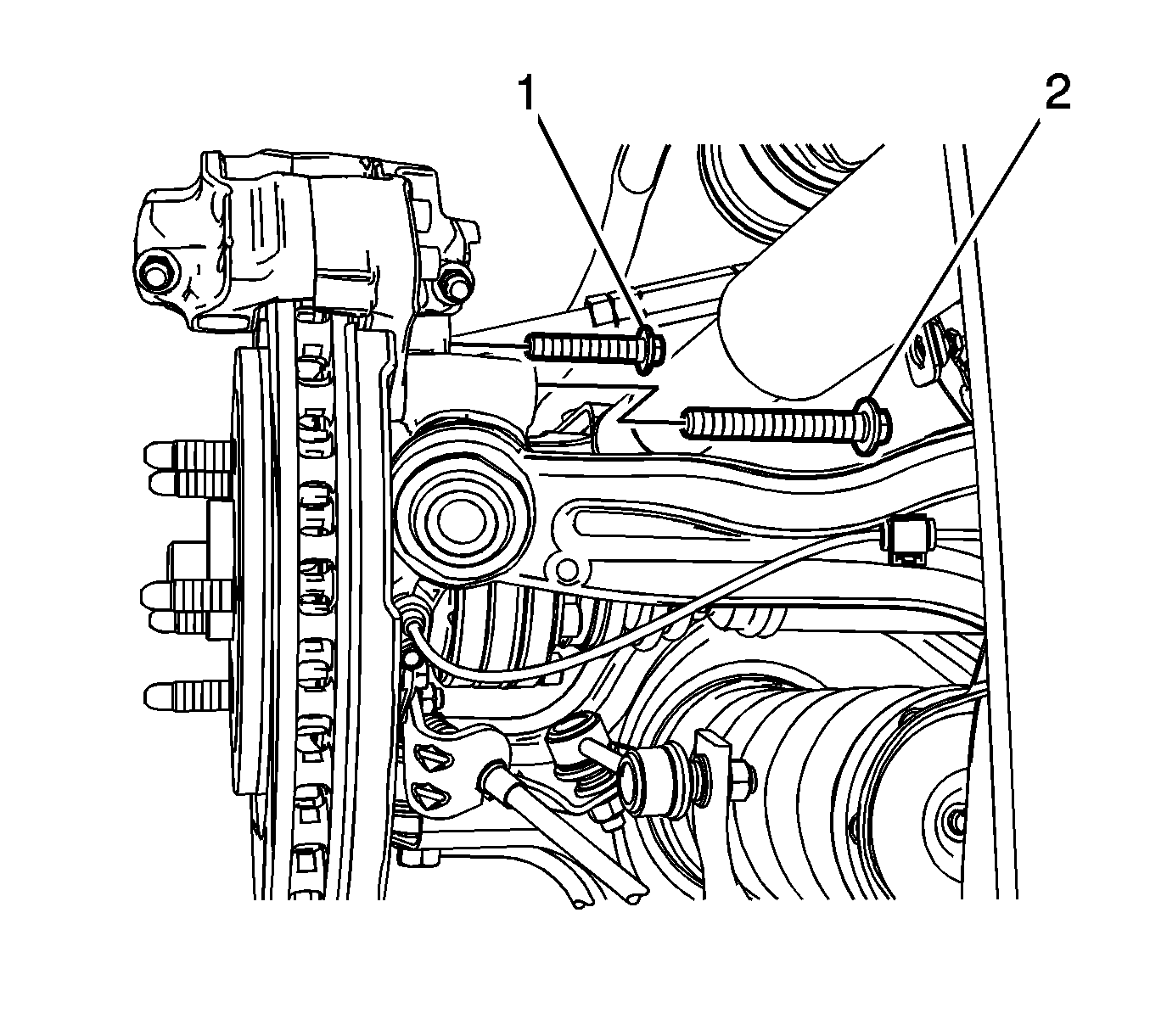
Installation Procedure
- Prepare the bolts and the threaded holes for assembly:
- Apply threadlocker GM P/N 12345493 (Canadian P/N 10953488), or equivalent to 2/3 of the threaded length of the brake caliper bolts. Ensure there are no gaps in the threadlocker along the length of the filled area of the bolts.
- Install the brake caliper and the brake caliper bolts (1) and tighten to 130 N·m (96 lb ft).
- Assemble the brake hose fitting bolt (1) and the 2 new brake hose fitting gaskets (2) to the brake hose (3)
- Install the brake hose assembly to the brake caliper and tighten the brake hose fitting bolt to 49 N·m (36 lb ft).
- Install the brake pads. Refer to Front Disc Brake Pads Replacement.
- Bleed the hydraulic brake system. Refer to Hydraulic Brake System Bleeding.
Note: If reusing the brake caliper to knuckle mounting bolts, the threads of the bolts and the threads of the knuckle mounting holes must be free of residue and debris prior to application of threadlocker in order to ensure proper adhesion and fastener retention.
| • | Thoroughly clean the residue from the bolt threads by using denatured alcohol or equivalent and allow to dry. |
| • | Thoroughly clean the residue from the threaded holes by using denatured alcohol or equivalent and allow to dry. |
Allow the threadlocker to cure approximately 10 minutes before installation.
Caution: Refer to Fastener Caution in the Preface section.


